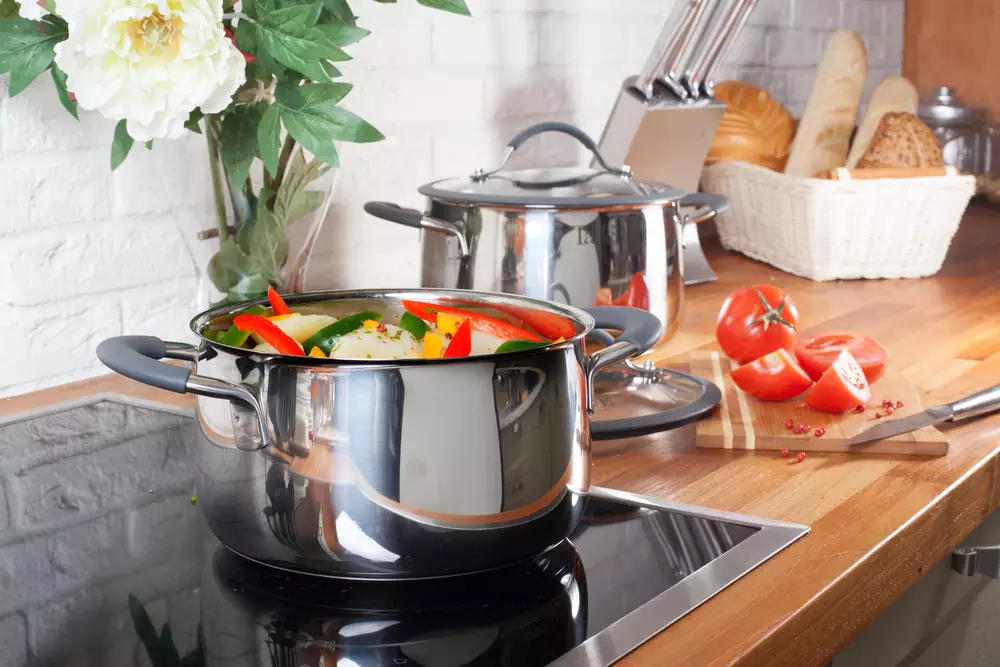Selecting the right cookware can be a daunting task, especially with the variety of stove types and cookware materials available in the market. One question that often arises is related to the compatibility of induction cookware with gas stoves.
The straightforward answer is yes, you can use induction cookware on a gas stove. This might come as a surprise to many since the working mechanisms of induction and gas stoves are quite different.
The reason for this compatibility lies in the design and material of induction cookware. They are made to withstand high temperatures and have a flat bottom, making them well-suited for both induction and gas stoves.
About Induction Cookware
Basics of Induction Cookware
Induction cookware is designed specifically for use with induction stoves. What differentiates them from other cookware is the presence of a magnetic base, essential for the induction heating process.
Key Features of Induction Cookware
Induction cookware is distinct due to its unique design and features. Primarily, they are recognized by their flat and smooth bottom. This feature is integral for ensuring maximum contact with the induction stove’s surface, promoting efficient heat transfer.
Additionally, the cookware is constructed from ferromagnetic or magnetic materials like stainless steel or cast iron, which are essential for the magnetic field interaction during the induction cooking process.
Moreover, these materials are excellent conductors of heat, enhancing cooking performance by ensuring even heat distribution and reducing hot spots that could otherwise compromise the quality of the cooked food.
How Induction Cookware Works
Induction cookware operates on the principle of electromagnetic induction. In an induction stove, there’s a coil of copper wire underneath the cooking surface, and an alternating electric current passes through it.
This action generates a dynamic magnetic field that interacts with the magnetic base of the induction cookware. The magnetic field induces electric currents, known as eddy currents, within the cookware.
These currents encounter resistance in the cookware material, leading to the generation of heat. The generated heat is then directly used for cooking. It’s important to note that the stove itself does not get hot; only the cookware does, which adds to the safety aspect of induction cooking.
Can You Use Induction Cookware on a Gas Stove?
Indeed, induction cookware can be used on a gas stove without any issues. The rationale behind this lies in the construction design and materials used in induction cookware. The flat bottom design promotes optimal contact with the gas stove surface, facilitating even heat distribution.
Moreover, the high heat conductivity of the induction cookware materials, typically stainless steel or cast iron, further aids in effective heat transfer and cooking performance on a gas stove.
However, it’s important to ensure that the cookware is appropriately sized for your gas burners to prevent heat wastage and uneven heating.

Differences between Induction and Gas Stoves
Fundamental Differences in Heating Mechanism
Gas and induction stoves represent two fundamentally different heating mechanisms. A gas stove relies on the combustion of gas, which produces heat that gets transferred to the cookware placed over the burners.
The heat is transferred primarily through convection and radiation. Conversely, an induction stove relies on the principle of electromagnetic induction, where the cookware itself generates heat due to the interaction of the magnetic field with the cookware’s magnetic material.
This heating method eliminates the need for a traditional heating element, making induction stoves more energy-efficient.
Impact on Cookware Selection
The differences in heating mechanisms between gas and induction stoves influence cookware choice. For gas stoves, cookware should have high heat tolerance due to the direct flame contact and should also possess good heat conductivity to evenly distribute heat.
Since induction cookware is designed to be heat-tolerant and has excellent heat conductivity, it qualifies as a suitable option for gas stoves. Nonetheless, it’s vital to ensure the cookware’s size matches your gas burner size to avoid uneven heating.
Pros and Cons of Using Induction Cookware on Gas Stove
Advantages: Potential Benefits
Using induction cookware on gas stoves comes with multiple benefits. Firstly, the flat-bottom design ensures maximal surface contact, resulting in better heat transfer and uniform cooking.
Secondly, induction cookware is known for its excellent heat retention, thereby maintaining consistent cooking temperatures even when the flame fluctuates. Thirdly, most induction cookware is made from high-quality materials, which enhance durability, ensuring that your cookware serves you well for a long time.
Lastly, the smooth and typically non-stick surface of induction cookware allows for easy cleaning, providing a user-friendly cooking experience.
Disadvantages: Possible Drawbacks
Despite the advantages, there could be a few drawbacks when using induction cookware on gas stoves. Induction cookware can be heavier compared to other cookware types due to the sturdy materials used in its construction.
This can make handling the cookware a bit challenging, especially for elderly users or those with mobility issues. Furthermore, induction cookware generally carries a higher price tag, which could be a potential deterrent for some users.
How to Identify Suitable Cookware for Your Stove
Factors to Consider
When choosing cookware for your stove, several factors come into play. These include the stove type (gas, electric, or induction), the material of the cookware (aluminum, stainless steel, cast iron, etc.), the cookware’s heat tolerance, and its size relative to your burner size. Other factors may include the cookware’s maintenance needs, its durability, and, of course, your budget.
Tips for Selecting Appropriate Cookware
For gas stoves, look for cookware with a flat bottom to facilitate even heat distribution. Additionally, the cookware should be able to withstand high temperatures due to the direct flame contact.
Induction cookware fits this bill perfectly due to its flat bottom, excellent heat conductivity, and high heat tolerance. However, always ensure that the cookware is not too large or too small for your gas burners. An ill-fitting cookware will lead to inefficient cooking, wasted heat, and possibly, unevenly cooked food.
Frequently Asked Questions
Is induction cookware safe to use on gas stoves?
Yes, induction cookware is entirely safe to use on gas stoves. They are designed to withstand high temperatures, and their flat bottom facilitates even heat distribution.
However, as with any cookware, it’s crucial to use them appropriately and follow any specific instructions provided by the manufacturer to ensure safety and longevity.
Will using induction cookware on a gas stove damage it?
No, using induction cookware on a gas stove will not damage either the cookware or the stove. It’s made of robust materials that can handle the high heat from gas stoves.
However, care should be taken to use the right size of cookware for the burner size to prevent heat wastage and potential damage to the stove or cookware.
Does induction cookware heat up faster on a gas stove?
The heating speed of cookware on a stove depends on several factors, including the stove’s heat output and the cookware’s material.
Induction cookware made of materials with high heat conductivity, such as cast iron or stainless steel, can heat up quickly on gas stoves. However, it’s important to note that the efficiency of heat transfer also significantly depends on how well the cookware fits on the gas burner.
